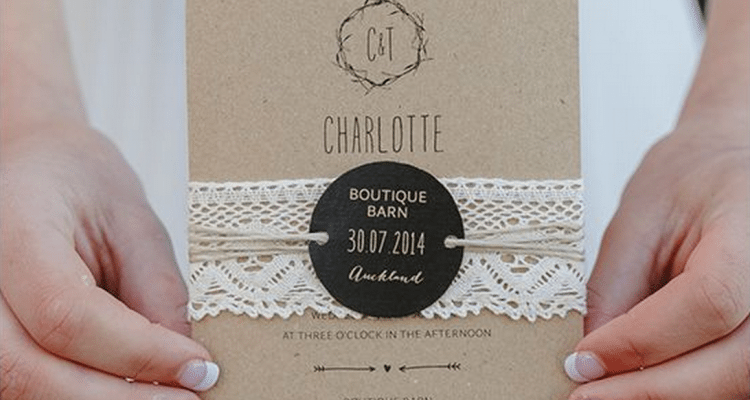Old-fashioned etiquette and oh-so-modern dilemmas: these two combined can perplex even the savviest bride when it comes time to word your wedding invitations. Couples often struggle with the demands of formal language when one or both sets of parents are divorced. Not to worry, though — we’ll cover some common situations, including this one. It’s easier than it seems at first blush to get the wording right.
More: Best Online Wedding Invitations | Wedding Invitation Etiquette
Divorced or Deceased Parents
The Divorced Parents, Remarried
Here’s how you word it when the bride’s divorced parents are co-hosting the wedding:
Mr. and Mrs. Michael Cuomo
at the marriage of their daughter …
The Divorced Parents, Not Remarried
Here’s another example, for parents of the bride who divorced but haven’t remarried:
Mr. Mitch Benn
at the marriage of their daughter …When the groom’s parents are divorced, just use the same approach. For example:
Mr. and Mrs. Arthur Bender
Selinde Anne Bender
to
Eric Allen Frazier
son of Mr. Travis Frazier
and Mr. and Mrs. Glenn Rikowski
The Deceased Parent
Another tough spot some couples encounter is the parent who’s deceased. In many cases, you’ll simply want to refer to the living parent as as the host. For example:
Mrs. Elias Araya
Lydia Alice Abbott
son of Mr. and Mrs. Midi Salemi
request the honor of your presence …Every family is different, so feel free to adapt these approaches to your own particular situation. The most important thing about invitation wording, other than it passing the basic “appropriate” test, is that you feel comfortable with it — and no one’s feelings get hurt.
Some Wedding Invitation Resources:
- Guide to Wedding Invitations
- The Do’s and Don’ts of Wedding RSVPs
- 10 Wedding Invitation Template Resources
- Rustic Yet Modern DIY Wedding Invitation Template + Directions
- DIY Banded Invitations with Template, Instructions and Material List
Who’s the Host?
There’s plenty of ways to word your invitations depending on who’s hosting — but what exactly does hosting mean?
The answer’s changed over time. In days gone by, when the bride’s parents typically paid for the wedding, the honored hosts were often those who footed the bill. These days, who you deem a host depends more on your personal preference than who’s literally burning up their credit cards on your behalf.
Some common options:
The Traditional “Host”
– the couple pays for the wedding themselves, but lists the bride’s parents as hosts, because it’s traditional.
The Inclusive “Hosts”
– the couple pays for the wedding themselves, but lists both sets of parents as hosts, because it’s gracious.
The Grooms’ Parents as Hosts
Occasionally, the couple will list the groom’s parents by themselves as hosts, sometimes because the bride’s parents are no longer living. In that case, simply word your invitation like so:
Mr. and Mrs. Clement Becker
Miss Amanda Jackson
to their son
Jason Michael Becker
The Couple as Hosts
And it’s not at all uncommon for the couple to present themselves as hosts of their own wedding, like so:
The honor of your presence
Ms. Mikal Farina
and
Mr. Jeffrey Evans
More:
- Crafty Ways to Make Your Wedding Invitations Unique
- Ultimate Guide to Wedding Invitations
- Top 10 Wedding Invitation Websites
- 10 Wedding Invitation Template Resources
- Rustic Yet Modern DIY Wedding Invitation Template + Directions
A Few More Sticky Widgets
“Kids not allowed.”
Many couples want to say it, but wonder if there’s a gentler way to put it across. Ms. Post would never approve, but in real life, we see invitations with “Adults Only” or “Adults Only Reception” printed across the bottom. Although it’s done, it’s still not kosher. The only proper way to address this is to include just the parents and not the children’s names on the invite. And as with other sensitive areas of wedding planning, it’s also helpful to lean on a family friend on or relative to help spread the word.
Registry Cards
Plus, it surely goes without saying that slapping registry cards in with your invites is never a good idea (no matter what those cheery clerks might tell you). Once again, this is a word-of-mouth deal. It’s also common to include registry info in bridal shower invitations, and these days, plenty of couples publish it in their wedding web sites. With so many big brands offering free sites for couples, this is a no-brainer.
Be Thoughtful, But Flexible
Your own situation might look a little daunting when you first try to translate it into the formal language of wedding invitations. The best approach: start with what you’re comfortable with, and use etiquette to guide, not dictate, your choices. Say what’s best for you and your fiancé, and you can’t go wrong.




